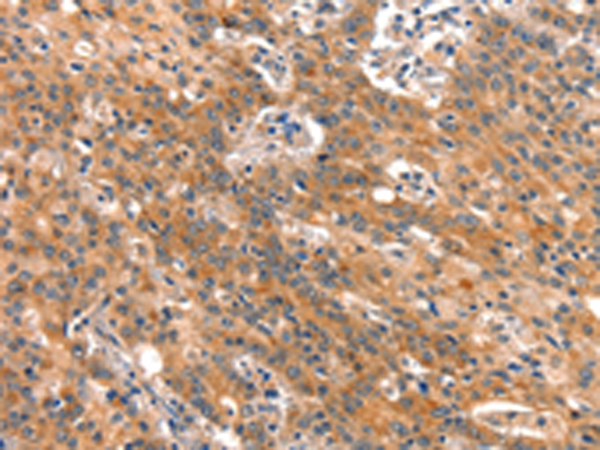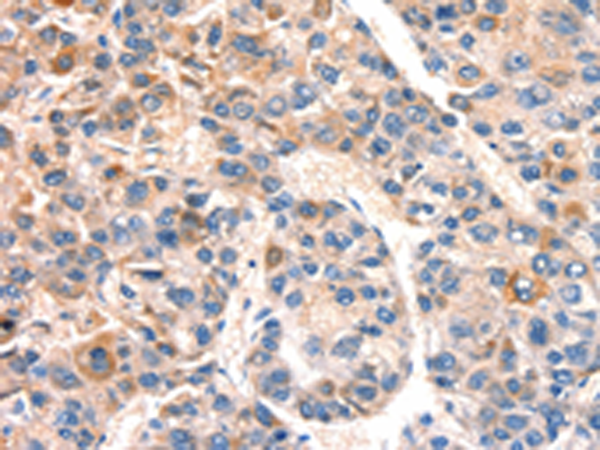


| WB | 咨询技术 | Human,Mouse,Rat |
| IF | 咨询技术 | Human,Mouse,Rat |
| IHC | 1/25-1/100 | Human,Mouse,Rat |
| ICC | 技术咨询 | Human,Mouse,Rat |
| FCM | 咨询技术 | Human,Mouse,Rat |
| Elisa | 1/1000-1/2000 | Human,Mouse,Rat |
| Aliases | BCL4; D19S37 |
| WB Predicted band size | 48 kDa |
| Host/Isotype | Rabbit IgG |
| Antibody Type | Primary antibody |
| Storage | Store at 4°C short term. Aliquot and store at -20°C long term. Avoid freeze/thaw cycles. |
| Species Reactivity | Human, Mouse |
| Immunogen | Synthetic peptide of human BCL3 |
| Formulation | Purified antibody in PBS with 0.05% sodium azide and 50% glycerol. |
+ +
以下是关于BCL3抗体的3篇参考文献的简要概括(文献信息为模拟示例):
1. **文献名称**:*BCL3 Expression in Colorectal Cancer: Association with Clinicopathological Parameters*
**作者**:Smith A, et al.
**摘要**:通过免疫组化(使用BCL3特异性抗体)分析结直肠癌组织中BCL3蛋白表达水平,发现其高表达与肿瘤侵袭性及患者预后不良显著相关,提示BCL3可能作为潜在的癌症标志物。
2. **文献名称**:*BCL3 Regulates NF-κB Activity via Interaction with HDAC1 in Inflammatory Macrophages*
**作者**:Li J, et al.
**摘要**:利用BCL3抗体进行Western blot和染色质免疫沉淀(ChIP)实验,发现BCL3通过招募组蛋白去乙酰化酶HDAC1抑制NF-κB的转录活性,从而调控巨噬细胞的炎症反应。
3. **文献名称**:*Development of a Novel Monoclonal Antibody against BCL3 for Flow Cytometry Applications*
**作者**:Wang Y, et al.
**摘要**:研究报道了一种新型BCL3单克隆抗体的开发与验证,该抗体在流式细胞术中表现出高特异性和灵敏度,成功用于检测B细胞淋巴瘤患者外周血中的BCL3阳性细胞。
4. **文献名称**:*BCL3 Stabilizes HER2 Protein in Breast Cancer Cells Promoting Chemoresistance*
**作者**:Garcia R, et al.
**摘要**:通过免疫共沉淀(使用BCL3抗体)和蛋白稳定性实验,揭示BCL3通过抑制HER2蛋白泛素化降解增强乳腺癌细胞对化疗药物的耐药性,为靶向BCL3的治疗策略提供依据。
(注:以上文献信息为示例性模拟,非真实存在的论文。)
**Background of BCL3 Antibody**
BCL3 (B-cell lymphoma 3) is a proto-oncogene-encoded protein belonging to the IκB family, which regulates NF-κB signaling—a critical pathway in immune responses, inflammation, and cell survival. BCL3 functions as a transcriptional co-regulator, binding to NF-κB homodimers (e.g., p50/p52) to modulate their nuclear retention and activity. Unlike classical IκB proteins that sequester NF-κB in the cytoplasm, BCL3 stabilizes NF-κB complexes in the nucleus, either enhancing or repressing target gene expression depending on cellular context.
Dysregulation of BCL3 is implicated in cancers, particularly B-cell malignancies, as well as inflammatory diseases. Overexpression of BCL3 has been observed in chronic lymphocytic leukemia, breast cancer, and colorectal carcinomas, often correlating with poor prognosis. Its role in promoting cell proliferation, inhibiting apoptosis, and sustaining chronic inflammation makes it a therapeutic target.
BCL3 antibodies are essential tools for studying its expression, localization, and interactions. They are widely used in techniques like Western blotting, immunohistochemistry (IHC), immunofluorescence (IF), and co-immunoprecipitation (Co-IP). Validated antibodies help identify BCL3’s involvement in disease mechanisms or drug responses. Researchers must select antibodies specific to BCL3 isoforms or post-translationally modified forms, depending on experimental goals. Commercial BCL3 antibodies are typically raised against epitopes in the N-terminal or ankyrin repeat domains, with cross-reactivity validated across species (human, mouse, rat). Proper controls are crucial to ensure specificity, given BCL3’s homology with other IκB proteins.
×